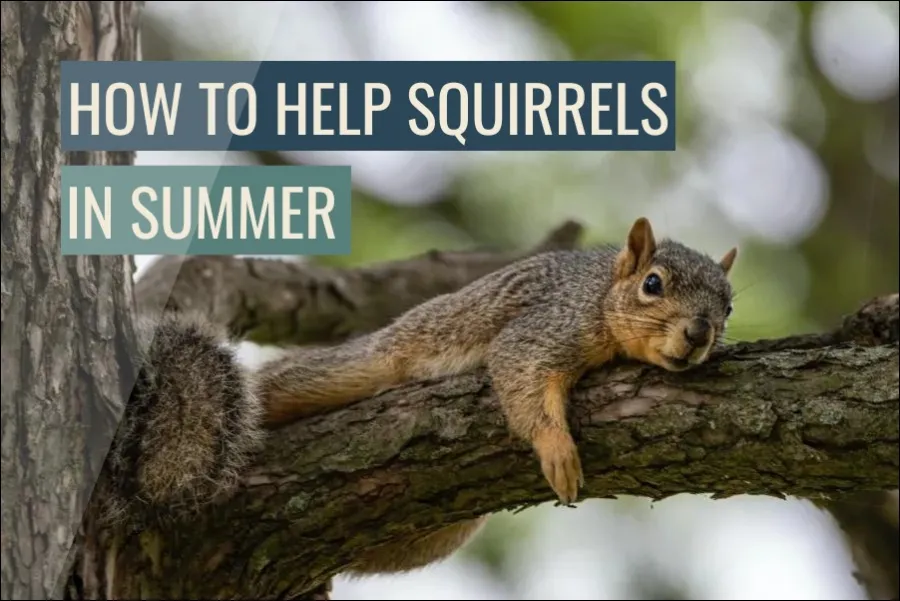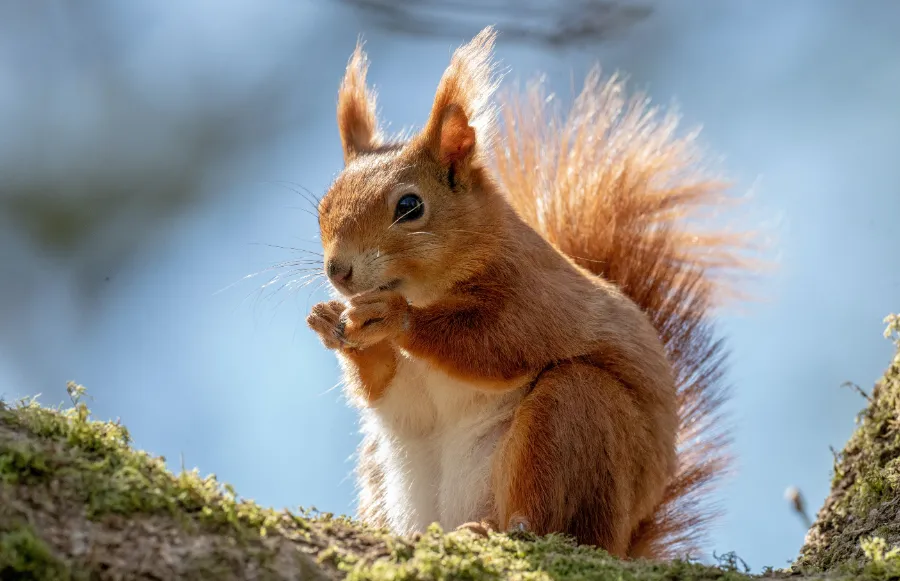
As the temperatures rise, squirrels may face a variety of challenges in their quest for food and shelter.
To help squirrels in the summer, provide extra sources of water and create a shady retreat for them to rest in. Keep cooled, non-salty treats on hand and monitor the temperature to ensure the squirrels are not in danger. Remember to keep a respectful distance and avoid feeding squirrels by hand.
Whether you’re an animal lover looking to make a difference or just want to do your part to support local wildlife, read on to learn more about how you can help squirrels in the summer.
Provide Extra Sources of Water
Squirrels may struggle to find enough water to drink when temperatures climb. This is especially true if natural water sources, like streams and ponds, are sparse in their environment. You may help by providing more sources of water for squirrels to drink. This may be as easy as leaving a shallow dish of water in your yard or installing a tiny water fountain designed expressly for animals. Keep the water clean and updated on a daily basis, and try placing a few tiny stones or sticks in the dish to make it easier for squirrels to get the water.
How Do You Cool Down Squirrels?
There are a few things you can do to keep squirrels cool in hot weather:
- Provide additional water sources – Make sure squirrels have constant access to clean, fresh water. Install a shallow dish of water in your yard or a tiny water fountain designed exclusively for wildlife.
- Make a shaded hideaway if squirrels need to escape the blazing sun. If you have a garden or a yard, try building a tiny shelter or shade structure for squirrels. This might be as easy as draping a sheet or canvas over a platform or constructing a temporary “tent” out of twigs and leaves.
- Keep cold goodies on hand – In exceptionally hot weather, provide squirrels cooling, non-salty food. Frozen fruits and vegetables, as well as little slices of watermelon, might be included. Just make sure to provide these goodies in moderation, since they should not constitute a large amount of the squirrel’s diet.
- Keep an eye on the temperature – If the weather is exceptionally hot and dry, it may be preferable to leave squirrels alone because they are well-equipped to deal with the heat. If you are concerned about a squirrel’s well-being, you can seek advice from a wildlife rehabilitation center.
Create a Safe Space for Nesting
In the summer, squirrels may have trouble locating adequate spots to make nests. This might be owing to a scarcity of trees or other structures, or to competition from other species. You may help by providing a safe place for squirrels to build their nests if you have a garden or a yard. This may be as simple as putting up a squirrel box or constructing a platform out of branches and leaves. Place the nest in a remote, protected location to safeguard the squirrels from predators and other risks.
Offer Supplemental Feeding
During the warmer summer months, squirrels may benefit from additional food sources in some circumstances. This is especially true if the squirrel’s natural food sources are limited or if the squirrel is wounded or orphaned. If you want to feed squirrels, make sure to use high-quality commercial squirrel food or a squirrel-specific homemade recipe. Human foods should be avoided since they are hazardous for squirrels and may attract other pests. It is also critical to maintain feeders clean and supplied, and to minimize overfeeding, which can result in waste and attract undesirable animals.
Protect Squirrels from Predators
Squirrels may be threatened by predators such as cats and birds of prey. Consider taking a few easy actions to help safeguard squirrels from these hazards. Keep your cat home or supervised while outside, for example, and consider installing a squirrel-proof feeder to deter birds of prey. You may also make your yard less appealing to predators by eliminating sources of food and shelter and trimming shrubs and trees.
Keep Squirrels Safe from Human Interference
When engaging in outdoor activities, it is essential to keep squirrels in mind. For example, if you’re going on a trek or visiting a park, keep your distance from squirrels and other wildlife. Hand feeding squirrels should be avoided since it might develop to reliance and hostility. When driving, keep an eye out for squirrels, as they may be more active in search of food and shelter during the summer months.

Provide Shelter from the Heat
Squirrels may require shelter from the scorching sun. If you have a garden or a yard, try building a tiny shelter or shade structure for squirrels. This might be as easy as draping a sheet or canvas over a platform or constructing a temporary “tent” out of twigs and leaves. Just be sure to put the shelter in a remote, protected spot to keep predators and other risks at bay.
Help Injured or Orphaned Squirrels
There are actions you may take if you come across a squirrel in need. If the squirrel is wounded, keep it calm and get help from a wildlife rehabilitation facility or veterinarian. If the squirrel is a baby or orphaned, do not attempt to feed it since the formula can cause it to aspirate. Instead, keep the squirrel warm and get advice from a wildlife rehabilitation agency on how to care for it. Most locations make it unlawful to keep wild animals as pets, so seek expert assistance.
Educate Others on How to Help Squirrels
Spread the word about how important it is to help local animals. Inform your friends, relatives, and social media followers on how to aid squirrels over the summer. You may also learn more about how to help squirrels and other animals by becoming involved with local conservation organizations or volunteering at a wildlife rehabilitation center.
Get Involved with Local Conservation Efforts
Consider volunteering or giving to groups dedicated to the conservation of squirrels and their habitats. Many conservation organizations rely on volunteers and donations to carry out their crucial job. You can also contact your local government or park agency to learn about chances to participate in conservation initiatives in your area.
Do Your Part to Protect the Environment
Simple efforts like minimizing your use of pesticides and single-use plastics may have a major impact on squirrels and other species. You may help maintain the environments on which squirrels and other animals rely by using ecologically friendly goods and practices. You may also help by saving water and energy, properly disposing of garbage, and engaging in neighborhood clean-up activities.
How do squirrels cope with heat?
Squirrels have a few adaptations that allow them to survive in hot weather:
- Squirrels will frequently seek for shady spots to relax in during hot weather. They may construct a cool, secluded area out of tree branches, leaves, or other natural constructions.
- Panting and sweating – Squirrels, like many other animals, pant and sweat to stay cool. They have sweat glands on their feet and may lick their fur to keep cool.
- Staying hydrated – Squirrels will drink extra water to stay hydrated in hot conditions. They may also consume meals rich in water, such as fruits and vegetables, to assist satisfy their fluid requirements.
- Controlling activity levels – Squirrels may be less active during hot weather to preserve energy and keep cool. They could also take more frequent rest periods in the shade.
In Conclusion
In conclusion, there are several strategies to assist squirrels throughout the summer. There are several possibilities to make a good influence, ranging from giving more supplies of water and establishing a safe location for nesting to safeguarding squirrels from predators and human interference and doing your part to protect the environment. By adopting these steps, you may assist squirrels and other local animals thrive over the summer months.
